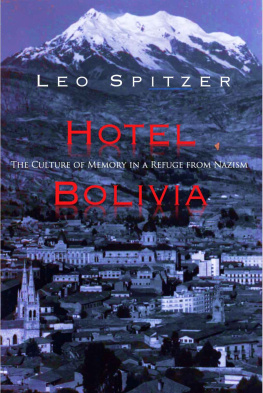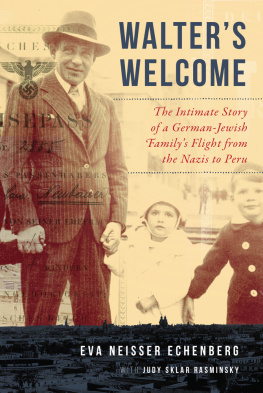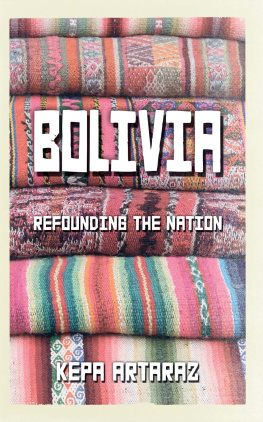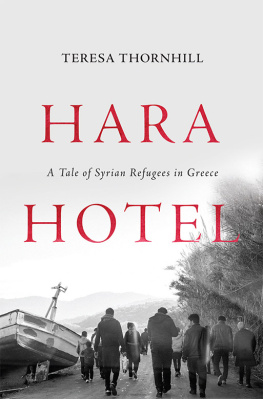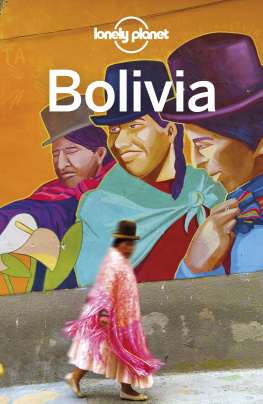Hotel Bolivia
The Culture of Memory in a Refuge from Nazism
by Leo Spitzer
Published by Plunkett Lake Press , April 2018
Copyright 1998 by Leo Spitzer
~ Other eBooks from Plunkett Lake Press ~
By Lucie Aubrac
Outwitting the Gestapo
By Ruth Bondy
The Emissary: A Life of Enzo Sereni
By Jean-Denis Bredin
The Affair: The Case of Alfred Dreyfus
By Lucy Dawidowicz
From That Place and Time: A Memoir, 1938-1947
By Inge Deutschkron
Outcast: A Jewish Girl in Wartime Berlin
By Helen Epstein
Children of the Holocaust: Conversations with Sons and Daughters of Survivors
Where She Came From: A Daughter s Search for Her Mother s History
By Charles Fenyvesi
When The World Was Whole: Three Centuries of Memories
By Harold Flender
Rescue in Denmark
By Peter Fraenkel
No Fixed Abode: A Jewish Odyssey to Africa
By Varian Fry
Surrender on Demand
By Sebastian Haffner
Churchill
Defying Hitler: A Memoir
The Meaning of Hitler
By Anthony Heilbut
Exiled in Paradise: German Refugee Artists and Intellectuals in America from the 1930s to the Present
By Eva Hoffman
Lost in Translation
By Kathryn Hulme
The Wild Place
By Sheila Isenberg
A Hero of Our Own: The Story of Varian Fry
By Heda Margolius Kov ly
Under A Cruel Star: A Life in Prague, 1941-1968
By Peter Kurth
American Cassandra: The Life of Dorothy Thompson
By Hillel Levine
In Search of Sugihara: The Elusive Japanese Diplomat Who Risked His Life to Rescue 10,000 Jews from the Holocaust
By Klaus Mann
The Turning Point: Thirty-Five Years in this Century, the Autobiography of Klaus Mann
By Jan Masaryk
Speaking to My Country
By Melita Maschmann
Account Rendered: A Dossier on my Former Self
By Jeffrey Mehlman
migr New York: French Intellectuals in Wartime Manhattan 1940-1944
By Yoel Palgi
Into the Inferno: The Memoir of a Jewish Paratrooper behind Nazi Lines
By David Schoenbrun
Soldiers of the Night: The Story of the French Resistance
By Claudine Vegh
I Didn t Say Goodbye
By Joseph Wechsberg
Homecoming
The Vienna I Knew: Memories of a European Childhood
By Benno Weiser Varon
Professions of a Lucky Jew
By Chaim Weizmann
Trial and Error: The Autobiography of Chaim Weizmann
By Susan Zuccotti
The Holocaust, the French, and the Jews
By Stefan Zweig
The World of Yesterday
For more information, visit www.plunkettlakepress.com
For Alex, Oliver, Gabriel
for Mindy and Erik
for Jessica
and for Zo
CONTENTS
PREFACE
Desperate to escape the increasingly vehement persecution in their homelands, thousands of refugees from Nazi-dominated Central Europe, the majority of them Jews, found refuge in Latin America in the 1930s. Bolivia became a principal recipient of this refugee influx by the end of the decade when Argentina, Brazil, Chile, and Mexico traditional countries of choice for European immigration closed their gates or applied severe restrictions to the entrance of newcomers. Indeed, in the panic months following the German Anschluss of Austria in March 1938 and Kristallnacht in November of that year, Bolivia was one of very few remaining places in the entire world to accept Jewish refugees.
In Bolivia, the refugees began to reconstruct a version of the world they had been forced to abandon. Their own origins and social situations were diverse in Central Europe, ranging across generational, class, educational, and political differences and incorporating various professional, craft, and artistic backgrounds. Some of them had at one time been engineers, doctors, lawyers, musicians, actors, and artists; others were skilled and unskilled workers whose livelihoods had been interrupted by Nazi exclusionary decrees. Although most who came to Bolivia were Jews or were married to Jews, a significant minority were non-Jewish political refugees: Communists, Socialists, and others persecuted by the Nazi regime. Jews themselves differed greatly in the degree of their identification with their religion and its traditions. There were Zionists, atheists, Orthodox, High Holiday Jews, and nonpractitioners among them. They shared a common identity as Jews only in the sense, perhaps, that they had all been defined as Jews from the outside that the Nazis had othered them as Jews.
No matter what their background differences had been in Europe, the vast majority of refugees arrived in South America in dire straits, with few personal possessions and very little money. This in itself had a leveling effect, cutting across their previous class distinctions. But other factors also helped to create a sense of collective identity among them, aiding in their adjustment and survival. Their common history of persecution was certainly one of these. Each and every refugee had been identified as undesirable, stripped of citizenship and possessions. Despite differences in the details of their particular experiences, they were all in the same boat. The war back in Europe, and the fact that so many of them had relatives and friends from whom they had been separated, were ever-present realities of which they were collectively conscious and that bonded them together. They kept themselves and each other informed of news about the war from accounts in the press and radio, and they shared efforts to discover the fate of those left behind. In this regard, the German language (which they spoke at home and among themselves) was their vehicle of inquiry, information, and unity, allowing them to communicate intimately and to express themselves with a degree of familiarity that most could never attain in the Spanish language of their surroundings.
But ultimately, it was Austro-German Jewish bourgeois society, the cultural end product of nineteenth-century Jewish emancipation in Central Europe, that gave the new arrivals a model for emulation and a common locus for identification in their place of refuge. Indeed, at the very time when that dynamic social and cultural amalgam was being ruthlessly and systematically destroyed by the Nazis, the Jewish refugees in Bolivia tried to recall and revive a version of it in a land thousands of miles from their home; in a country that offered them a haven, but in which many of them felt themselves as mere sojourners.
Hotel Bolivia examines this particular episode as a point of entry for the exploration of an important but generally neglected aspect of the experience of group displacement the relationship between memory and cultural survival during an era of persecution and genocide. Taking into account the inherently constructed nature of memory, my purpose is to analyze the social and ideological dimensions influencing individual and combined recollections, and the ways in which past experience is shaped, reorganized, transformed, and narrated to serve changing needs. In this sense, especially, this book is more than the historical presentation of a significant, yet not widely recognized, refuge from Nazi persecution. It contributes to, and is in dialogue with, a major objective of contemporary historical and cultural studies: the effort to document the life stories and reclaim the memories and discourses of ordinary persons who might otherwise remain hidden from history. And it is directly concerned with theoretical issues, increasingly evident in historical writing, having to do with the contextualization of memory and the interdependence and tension between memory and history. In reflecting on representations of remembered experiences, and on changes within these over time and between people I hope to contribute to the historical study of memory itself.
Alto Per , the region that became Bolivia after gaining its independence from Spain in 1824, had once before been the refuge of people escaping religious intolerance and persecution in Europe. In the course of the sixteenth century, and during the extended, often brutal sway of the Spanish Inquisition, thousands of New Christians, or Marranos persons of Jewish origin who had been converted to Christianity by force or prudent choice of their own left the Iberian peninsula; clandestinely or openly, many sought haven in Spain s Latin American colonies. Bringing badly needed technical and entrepreneurial skills with them, a number of Marranos settled around the silver-mining areas of Potos and in centers of trade and commerce like Chuquisaca (later Sucre), Santa Cruz, and Tarija. Over the years, some of these Marranos, or their offspring, intermarried with local Christians and were integrated into the Catholic establishment. In the process, the background religious stain that had made them identifiable as outsiders was blurred if not eradicated. But traces of their Sephardic ancestry survived discernible both in family names and in customs of Jewish origin that were perpetuated for generations, despite the loss of their original meaning.
Next page
